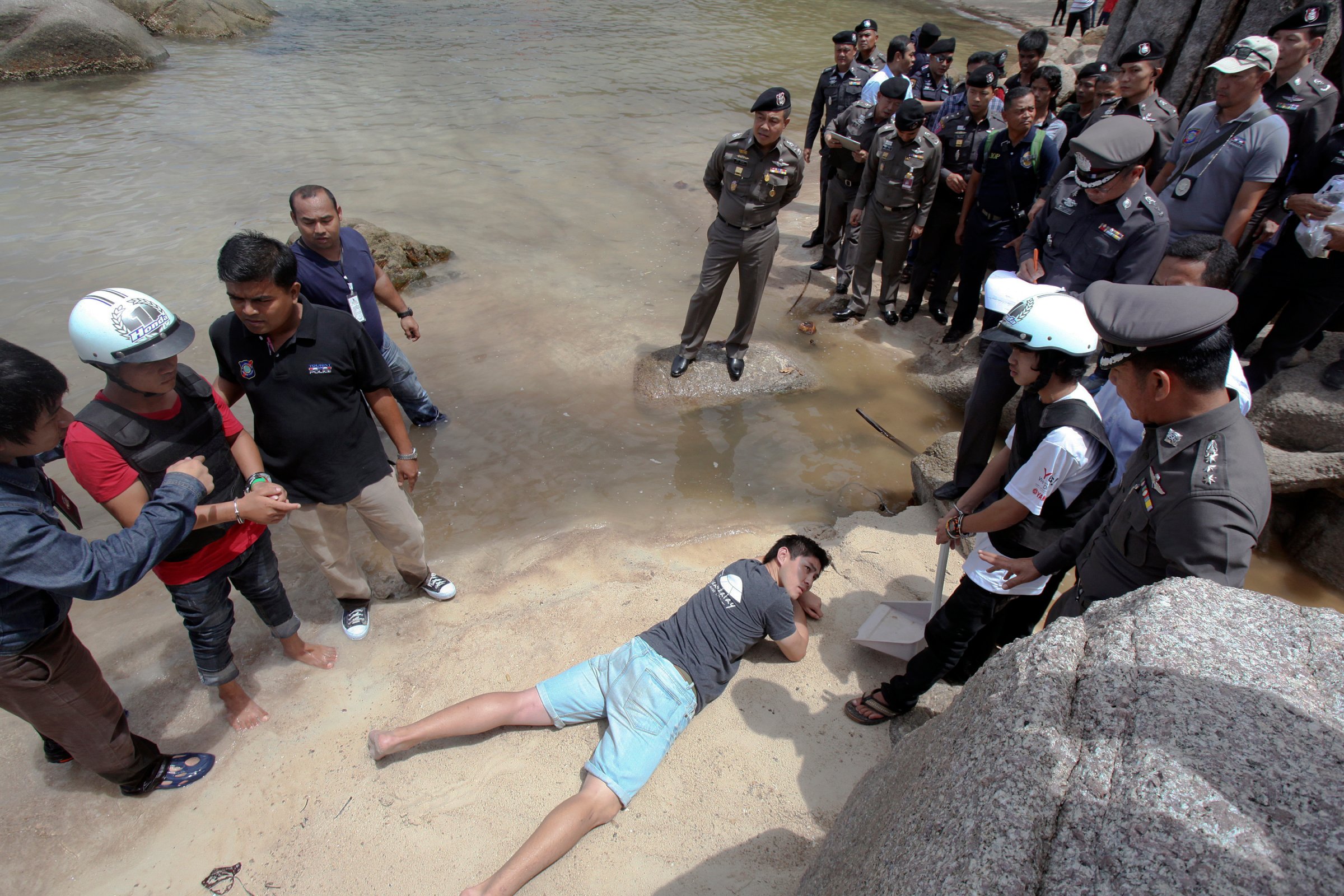
Murdered British backpacker Hannah Witheridge was finally laid to rest in England on Friday. But 6,000 miles away in Thailand, the investigation into her tragic death, and that of her friend David Miller, whose funeral took place Oct. 3, spiraled further into farce.
The main suspects in the killings, which took place on the Thai Gulf island of Koh Tao, have reportedly claimed that they were tortured into a confession, and public prosecutors rejecting the police report.
“The two victims and their families deserve justice, which will only be possible if there is a fair and transparent process,” says Kingsley Abbott, Bangkok-based adviser for the International Commission of Jurists. Above all, he adds, “the burden of proof rests on the prosecution,” as the “two men must be presumed innocent until proven guilty.”
On Sept. 15, the bloodied bodies of Witheridge, 23, and Miller, 24, were discovered on the island that is famous among scuba divers and sandal-clad tourists for its pristine beaches and coral reefs.
Burmese nationals Zaw Lin and Win Zaw Htun, both 21, were arrested last Friday and quickly confessed to the double murder. They had apparently worked illegally on the island for a number of years and were driven, say police, by a desire to rape Witheridge after seeing the young British couple canoodling on the white sand.
The Thai authorities then dragged the two suspects to the rocky outcrop where the tourists’ bodies were found for a grisly re-enactment. Wearing helmets and body armor, they demonstrated for assembled media how the bludgeoning, using a garden hoe and wooden stake, took place and prayed for forgiveness. Both could face a death sentence if convicted.
Yet a litany of questions and inconsistencies hang over the investigation. Other than the apparent retraction, proffered by an official at the Burmese embassy, there has been a rejection of the police’s investigation report, with public prosecutors on Wednesday asking the authors to supply “more crucial information,” “fix certain flaws” and make the 850-page document “more succinct.”
Numerous character witnesses have come out to defend Zaw Lin and Win Zaw Htun and they have no criminal record. Essentially, the case against them hinges on five strands of evidence:
But there are numerous other threads to tug. Given that Burmese migrants were in the spotlight from the outset, and this pair were well-known on the island and frequently seen in the vicinity of the crime scene, why were they not hauled in for DNA tests and questioning sooner?
In addition, there have been significant procedural irregularities, including allowing tourists into the crime scene before all evidence was collected. CCTV footage has been produced, but with significant gaps, and only from a selection of the many sources available. The defense team will want to examine this all. There is also no complete, undisputed timeline of Witheridge and Miller’s movements prior to the attack. Considering the notoriety of the case, and the victims’ sociable nature in this small community, that is very odd.
Finally, there has been rampant press coverage of the unsubstantiated remarks made by local officials. In the latest, the chief of the prison where the suspects are being held told a reporter Thursday he “is afraid they may commit suicide” because they are “feeling guilty for the crime.”
Thailand does not have jury trials and so the press has free reign to report on ongoing investigations, with the presumption that the sitting judge will be able to discount all speculation and concentrate on the evidence in hand. Even so, it is clearly prejudicial to the suspects to have individuals from such diverse sources as Burmese embassy, the Myanmar Migrant Labour Association and the Thai police, among others, talking openly to the media about what the suspects supposedly think and feel.
“That all these people are coming out and making these statements is incredibly detrimental to a fair trial,” says British labor-rights activist Andy Hall, who, as part of a monitoring mission, has met with the accused, the police, the prosecution team and British Ambassador Mark Kent.
Abbott agrees that normal procedure for a defense counsel would be to stop any further comment. “Our primary concern at this stage is to ensure the two suspects are provided with the assistance of a competent lawyer of their choosing,” he says, adding that whoever is chosen must have “adequate time and facilities to review the evidence.”
Otherwise, we may have to mourn not two, but four lives senselessly lost that night on Koh Tao.
More Must-Reads from TIME
- Cybersecurity Experts Are Sounding the Alarm on DOGE
- Meet the 2025 Women of the Year
- The Harsh Truth About Disability Inclusion
- Why Do More Young Adults Have Cancer?
- Colman Domingo Leads With Radical Love
- How to Get Better at Doing Things Alone
- Michelle Zauner Stares Down the Darkness
Write to Charlie Campbell at charlie.campbell@time.com